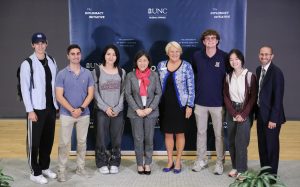This article is written by Claire Cusick of UNC Global Affairs. The original article can be found here.
U.S. Trade Representative Katherine Tai, the latest global leader to participate in Carolina’s Diplomacy Initiative, outlined a worker-centered trade policy that emphasizes sustainability and equity.
The United States is pursuing a new approach to its trade policy, said Ambassador Katherine Tai, U.S. Trade Representative and a member of President Biden’s Cabinet, in a speech delivered to a packed house at Mandela Auditorium on Tuesday, Sept. 26. America’s chief trade negotiator came to campus to participate in the UNC Diplomacy Initiative’s Diplomatic Discussions series.
“The world that you are inheriting is complicated, and issues that are front and center now will continue to be in the world that you will shape and lead,” said Tai, directly addressing UNC students. At the heart of many challenging issues—climate change, labor conditions, access to vaccines—is international trade.
For decades, Tai said, the U.S. has pursued a trade policy that emphasized opening new markets and eliminating tariffs. While that approach generated economic activity and reduced poverty in some regions, its focus on maximizing efficiency had downsides, including economic inequality in the U.S., a decrease in American manufacturing centers, jobs being sent overseas, and fragile supply chains. “You deserve the changes that make things better and apply lessons – hard-won lessons – from past mistakes,” she said.
Tai’s message to students underscored the importance of the Diplomacy Initiative, which recognizes that the grand challenges of our time do not live neatly within national borders. Led by Vice Provost for Global Affairs Barbara Stephenson, a former U.S. ambassador, the Diplomacy Initiative prepares Carolina students to become the next generation of global leaders by giving them direct access to the world of diplomacy.
Since March 2021, when Tai was sworn in after her appointment was unanimously confirmed by the U.S. Senate, the trade representative has pursued a trade policy that is “more resilient, sustainable and inclusive,” she said. To achieve that, the policy puts workers at its center.
Under the new trade policy, the U.S. is strengthening collaboration with its partners and allies. One example is the Indo-Pacific Economic Framework for Prosperity (IPEF), a new type of trade deal launched in 2022 with 13 countries in the Asia-Pacific region, aimed at improving economic competition while also improving labor and environmental standards.
Tai spoke of her work enforcing current trade rules—like safe worker conditions and labor union protections—and holding trade partners accountable. She said the new approach will mean “incorporating more voices in our trade policy to ensure fair and equitable outcomes.”
Tai said she wants to hear from people all across America, in different regions and various economic sectors, to get a clearer picture of how trade policy affects Americans. Prior to her appearance at UNC, Tai participated in two roundtable discussions in Raleigh to hear directly from North Carolinians. One was with Asian American, Native Hawaiian, and Pacific Islander state political leaders, and the other with turkey farmers.
She said she wanted to hear UNC students’ opinions on the economy. “Where are your hopes, and where are your anxieties, and how can we be remaking our economy, using the tools in the trade policy toolbox to help?”

Vice Provost for Global Affairs and Chief Global Officer, and undergraduate students at UNC-Chapel Hill.
After her remarks, Tai engaged in a wide-ranging conversation with Stephenson, Carolina’s chief global officer. The former U.S. ambassador and career diplomat recalled her own experiences promoting free trade agreements with Europe and Panama as popular support waned under Presidents George W. Bush and Barack Obama, but the results of the 2016 election provided “a reckoning,” Stephenson said. “I had to accept in a big way that we in the foreign policy establishment had not brought the American people along with us on this… When you lose the support of the people you thought you were representing, it’s time to ask what went wrong.”
More than 400 people attended the event in person, filling Mandela Auditorium and two overflow rooms to capacity. UNC students came prepared with questions about U.S.-China relations, and about how Tai’s identity as an Asian American woman has influenced her relationships with trade partners. Tai answered that she thinks she gets recognized in Asia more than she does here at home, and that she considers it a privilege and a responsibility to represent the United States. “I think that it is going to be part of American leadership to be able to build more bridges with more, different countries in the world, and I’m really, really proud to be a part of that,” she said.
Tai’s visit was the third in a series of high-profile Diplomatic Discussions focusing on international trade. Frederick W. Smith, founder and executive chairman of FedEx Corporation, called for U.S. reengagement in multilateral trade agreements during his campus visit in September 2022. Rana Foroohar, Financial Times columnist and CNN analyst, spoke about prioritizing economic resilience at home over global market efficiencies—the thesis of her book Homecoming—in a presentation to Carolina audiences in March 2023.
Diplomatic Discussions is part of UNC’s Diplomacy Initiative, now in its third academic year. The Diplomacy Initiative expands opportunities for students and faculty to learn and teach about the role of diplomacy in solving global challenges. The initiative builds on Carolina’s standout strengths in area and language studies as well as curricula in Global Studies and Peace, War and Defense.
After Tai’s visit, Stephenson said she was thrilled that UNC students got to engage with Tai. “Ambassador Tai—a committed public servant, policy expert, and skilled diplomat—models the type of global leader that we are preparing Carolina students to become,” she said.
